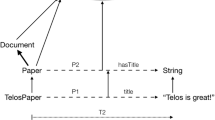Abstract
Several metamodels have been proposed in the software engineering literature recently. For practical usage, it is important to ensure that these metamodels can be used in an interoperable fashion. In this paper we present an approach as a part of our PhD research in the same direction. Our methodology is based on the study of analogous characteristics among metamodels, ontologies and schemas. We have adopted ontology merging and schema matching techniques and apply them to the domain of metamodels to assist in creating interoperable metamodels. This methodology is applied and presented here with an illustrative example in which we show the results of merging two of the OMG metamodels: the Organization Structure Metamodel (OSM) and the Business Process Modelling Notation (BPMN).
Access this chapter
Tax calculation will be finalised at checkout
Purchases are for personal use only
Preview
Unable to display preview. Download preview PDF.
Similar content being viewed by others
References
Henderson-Sellers, B., Qureshi, M.A., Gonzalez-Perez, C.: Towards an Interoperable Metamodel Suite: Size Assessment as One Input. International Journal of Software and Informatics (2011) (accepted for publication)
OMG: large volume of emails in online discussion groups during 2009 (2009)
Bezivin, J., Gerbe, O.: Towards a Precise Definition of the OMG/MDA Framework. In: Proceedings of the 16th IEEE International Conference on Automated Software Engineering. IEEE Computer Society (2001)
OMG: MDA Guide, version 1.0.1. omg/2003-06-01 (2003)
Bézivin, J., Soley, R.M., Vallecillo, A.: Proceedings of the First International Workshop on Model-Driven Interoperability. ACM (2010)
Gonzalez-Perez, C., Henderson-Sellers, B.: An ontology for software development methodologies and endeavours. In: Ontologies in Software Engineering and Software Technology, pp. 123–152. Springer, Berlin (2006)
Bézivin, J., Vladan, D., Dragan, D., Jean-Marie, F., Dragan, G., Frederic, J.: An M3-Neutral Infrastructure for Bridging Model Engineering and Ontology Engineering. In: Interoperability of Enterprise Software and Applications, pp. 159–171. Springer, London (2006)
Henderson-Sellers, B.: Bridging Metamodels and Ontologies in Software Engineering. Software and Systems 84 (2011) (in press)
Devedzić, V.: Understanding ontological engineering. Communications of the ACM 45, 136–144 (2002)
Mohsenzadah, M., Shams, F., Teshnehlab, M.: A new approach for merging ontologies. Worlds Academy of Science and Technology, 153–159 (2005)
Noy, N.F., Musen, M.A.: An Algorithm for Merging and Aligning Ontologies: Automation and Tool Support. In: Sixteenth National Conference on Artificial Intelligence (AAAI 1999). AAAI Press, Orlando (1999)
Stumme, G., Maedche, A.: FCA-MERGE: Bottom-Up Merging of Ontologies. In: International Joint Conference on Artificial Intelligence (2001)
de Bruijn, J., Ehrig, M., Feier, C., Martíns-Recuerda, F., Scharffe, F., Weiten, M.: Ontology Mediation, Merging, and Aligning. In: Semantic Web Technologies (2006)
Predoiu, L., Feier, C., Scharffe, F., Bruijn, J.d., Martin-Recuerda, F., Manov, D., Ehrig, M.: State-of-the-art survey on Ontology Merging and Aligning V2. EU-IST Integrated Project (2005)
Maedche, S.: Comparing Ontologies - Similarity Measures and a Comparison Study. Institute AIFB, University of Karlsruhe, Internal Report (2001)
Levenshtein, V.I.: Binary codes capable of correcting deletions, insertions and reversals. Soviet Physics Doklady 10, 707–710 (1966)
Chukmol, U., Rifaieh, R., Benharkat, N.A.: EXSMAL: EDI/XML semi-automatic Schema Matching Algorithm. In: Seventh IEEE International Conference on E-Commerce Technology (CEC 2005) (2005)
de Sousa Jr., J., Lopes, D., Claro, D.B., Abdelouahab, Z.: A Step Forward in Semi-automatic Metamodel Matching: Algorithms and Tool. In: Filipe, J., Cordeiro, J. (eds.) Enterprise Information Systems. LNBIP, vol. 24, pp. 137–148. Springer, Heidelberg (2009)
OMG: Business Process Modelling Notation Beta1. v 2.0. OMG (2009)
OMG: Organization Structure Metamodel. 3rd Initial Submission. OMG (2009)
Hug, C., Front, A., Rieu, D., Henderson-Sellers, B.: A method to build information systems engineering process metamodels. Journal of Systems and Software 82, 1730–1742 (2009)
Miller, G.A.: WordNet: A Lexical Database for English. Communications of the ACM 38, 39–41 (1995)
Bernon, C., Gleizes, M.-P., Peyruqueou, S., Picard, G.: ADELFE: A Methodology for Adaptive Multi-agent Systems Engineering. In: Petta, P., Tolksdorf, R., Zambonelli, F. (eds.) ESAW 2002. LNCS(LNAI), vol. 2577, pp. 156–169. Springer, Heidelberg (2003)
Zambonelli, F., Jennings, N., Wooldridge, M.: Developing multiagent systems: The Gaia methodology. ACM Trans. Softw. Eng. Methodol. 12, 317–370 (2003)
Bernon, C., Cossentino, M., Gleizes, M.-P., Turci, P., Zambonelli, F.: A Study of Some Multi-agent Meta-models. In: Odell, J.J., Giorgini, P., Müller, J.P. (eds.) AOSE 2004. LNCS, vol. 3382, pp. 62–77. Springer, Heidelberg (2005)
OMG: Ontology Definition Metamodel V 1.0 (2009)
OMG: Architecture-Driven Modernization (ADM): Software Metrics Meta-Model (SMM). FTF - Beta 1 (2009)
OMG: Software & Systems Process Engineering Meta-Model Specification (2008)
ISO: Software Engineering Metamodel for Development Methodologies (2007)
Guizzardi, G.: On Ontology, Ontologies, Conceptualizations, Modeling Languages, and (Meta)Models. Frontiers in Artificial Intelligence and Applications 155, 18–39 (2007)
Guizzardi, G.: Ontological Foundations for Structural Conceptual Models. Telematica Instituut Fundamental Research Series (2005)
Author information
Authors and Affiliations
Editor information
Editors and Affiliations
Rights and permissions
Copyright information
© 2012 Springer-Verlag Berlin Heidelberg
About this paper
Cite this paper
Qureshi, M.A. (2012). Interoperability of Software Engineering Metamodels. In: Kienzle, J. (eds) Models in Software Engineering. MODELS 2011. Lecture Notes in Computer Science, vol 7167. Springer, Berlin, Heidelberg. https://doi.org/10.1007/978-3-642-29645-1_3
Download citation
DOI: https://doi.org/10.1007/978-3-642-29645-1_3
Publisher Name: Springer, Berlin, Heidelberg
Print ISBN: 978-3-642-29644-4
Online ISBN: 978-3-642-29645-1
eBook Packages: Computer ScienceComputer Science (R0)




